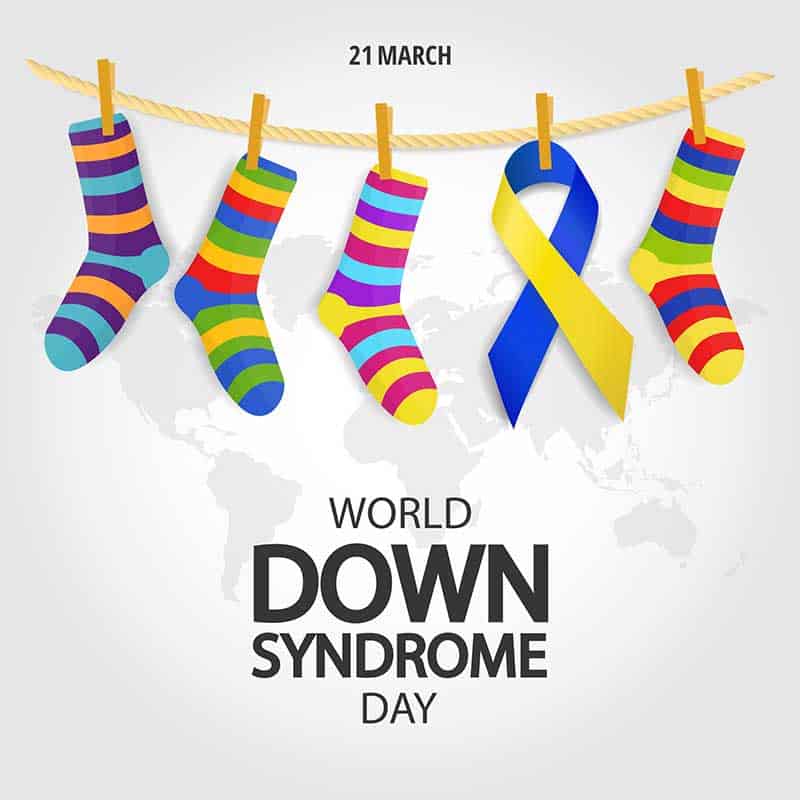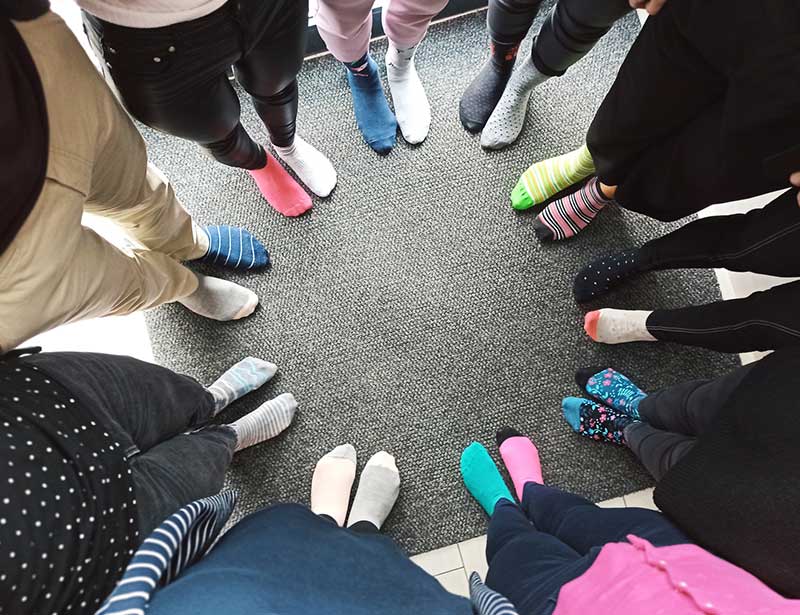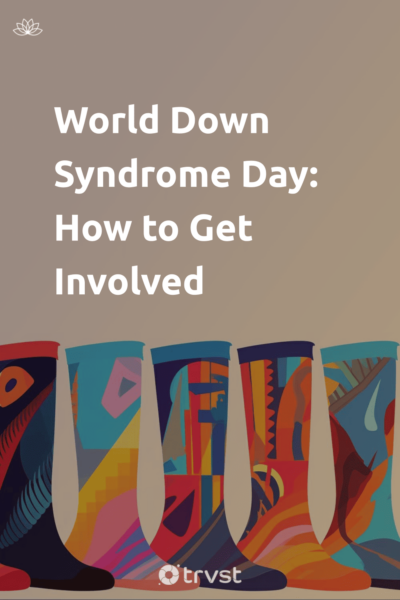World Down Syndrome Day: How to Get Involved
On the 21st of March each year, we recognize World Down Syndrome Day to celebrate the remarkable lives of those with Down syndrome.
World Down Syndrome Day celebrations span the globe, ranging from educational talks to inclusive community events, each sharing a common objective - to shift societal viewpoints, fostering understanding and respect for those with Down syndrome.
Furthermore, this day calls on individuals, communities, and organizations to advocate for a more inclusive society that values the contributions of those with Down syndrome.
Featured in: March - Awareness Months, Days & Observances.
World Down Syndrome Day History and Background

World Down Syndrome Day began on Tuesday, March 21, 2006. What is the significance of the date? It symbolizes the tripling of the 21st chromosome, the unique genetic arrangement that results in Down Syndrome2.
Interestingly, the driving force behind this initiative was a French organization—Association Française pour la Recherche sur la Trisomie 21, or AFRT. Their goal? To raise awareness with a day that amplifies the voices of those with Down Syndrome, rallying for their rights, inclusion, and well-being.
Fast forward to December 19, 2011, and the United Nations General Assembly officially recognized March 21 as World Down Syndrome Day. This global acknowledgment began an annual flurry of events and activities to observe World Down Syndrome Day globally.
Imagine the buzz at the United Nations Headquarters in New York on March 21, 2012. The inaugural World Down Syndrome Day conference is in full swing, marking the first significant milestone post-global recognition.
What followed? A series of themes for each global awareness day, from the empowering "My Friends, My Community" to the assertive "We Decide." These themes weren't just catchy phrases. They specifically paved the path for advocacy via a single global voice, awareness, and action, knitting together a tapestry of understanding and inclusivity.
In 2023, the theme was “With Us Not For Us,” focusing on a human rights-based approach championing fair treatment and the same opportunities for those with disabilities. Further, the Down Syndrome International Network is campaigning in 2023 for the right to legal capacity for those impacted by Down Syndrome.
The Cause and Its Challenges

World Down Syndrome Day recognizes a genetic condition marked by an extra copy of the 21st chromosome. It's not a rarity - Down Syndrome appears in approximately one out of every 700 newborns in the United States. That makes it the most common chromosomal condition around. But what does this extra chromosome mean? Usually, it leads to physical abnormalities, developmental delays, and intellectual disabilities.
Life isn't easy for those living with Down Syndrome. Take education, for example. These individuals often find it tough to access it equally. This hurdle reduces their chances of blending into society to a large extent.
Then there's the healthcare landscape. Here's an alarming fact - around half of the children diagnosed with Down Syndrome in the United States have congenital heart defects. Regular medical check-ups and surgeries become a part of their routine. However, the lack of consistent early intervention services and support is more concerning. When present, these can bring about major positive changes in their lives.
Fighting stigma and toward equal opportunity
Society's perceptions of Down Syndrome add to their struggles. Misconceptions are aplenty, and stigma is widespread, preventing these individuals from opportunities they are entitled to. As a result, they end up isolated, and social acceptance becomes a far-off dream.
Furthermore, only about 20% of American adults with Down Syndrome have a job. And even though medical advances have pushed their average life expectancy to around 60 years, it's still significantly lower than that of the general population.
Improving the quality of life for people with Down syndrome entails addressing their healthcare needs and ensuring they are treated fairly. Specific to the condition, these needs typically involve regular consultations with health professionals to monitor their mental and physical health. Similarly, they provide timely interventions such as physiotherapy, occupational therapy, speech therapy, counseling, and specialized education.
To achieve the best quality of life, individuals with Down syndrome require support from their parents, medical professionals, and inclusive community support systems, including education at all levels.
5 Important Reasons Why World Down Syndrome Day Matters
- Down syndrome, often perceived as an illness or disease, is actually a genetic condition. An extra 21st chromosome, either in whole or part, is the culprit behind this condition. This additional genetic material disrupts normal development, causing the physical and cognitive characteristics we associate with Down syndrome. But remember, it also provides those who carry it with a unique lens to view the world.
- Despite being the most prevalent chromosomal condition, affecting 1 in every 700 babies in the United States, Down syndrome's impact varies widely. The spectrum ranges from mild effects to significant health and developmental issues like congenital heart defects or hearing loss.
- The advances in healthcare and societal integration have been game-changers for those with Down syndrome1. Back in 1983, their life expectancy was a mere 25 years. Fast-forward to today, many live beyond 60 years.
- Cognitive delays are common among individuals with Down syndrome, but it's crucial to remember that intellectual disability usually falls in the mild to moderate range. With the right resources, from education to career training and social inclusion, individuals with Down syndrome can prosper in their communities and lead vibrant, fulfilling lives.
- Down syndrome may pose challenges, but those living with it continue to inspire their families and communities. They attend school, work, make decisions that impact them, form meaningful relationships, vote, and make significant societal contributions. Their indomitable spirit and love for life shatter misconceptions about the condition, proving they are not defined by their diagnosis.
How to Get Involved and World Down Syndrome Day

World Down Syndrome Day is ushered in with a burst of color each year, thanks to the Down Syndrome International Network (DSi) and their "Lots of Socks" campaign.
This creative initiative encourages everyone to don mismatched, brightly colored socks. These aren't just eye-catching fashion statements, though. They're conversation starters designed to spark discussions about Down syndrome and raise awareness.
Have you ever attended a webinar or workshop on Down syndrome? If not, here's why you should. It's not just about learning facts and statistics. It's about gaining a richer, deeper understanding of what life is like for individuals with Down syndrome.
Share your insights on social media, start conversations, debunk myths, and help raise public awareness. All it takes is a post or a tweet to make a difference. And make sure you join the conversation using the hashtags #worlddownsyndromeday and #lotsofsocks.
You may be more of a hands-on person. If so, plenty of local organizations supporting the Down syndrome community could use your help. Imagine facilitating a support group, spearheading an educational program, or leading fun-filled recreational activities. Sounds fulfilling, doesn't it?
And if you're more comfortable behind the scenes, how about fundraising? Think about hosting a charity auction or garage sale. Every cent raised can push research forward, help create awareness, and provide essential resources for individuals with Down syndrome.
Conclusion
World Down Syndrome Day, officially observed on the 21st of March annually, is a testament to the remarkable progress individuals with Down syndrome can make when given the opportunity. With every personal story shared and every spirited event, we gradually dispel misconceptions, unveiling the radiant personalities and unique capabilities of those touched by Down syndrome.
Whether broadening minds through enlightening conversations, dedicating your time to volunteer work, or supporting organizations at the forefront of championing this cause, every effort carries weight.
World Down Syndrome Day FAQs
Down syndrome is a genetic disorder caused by the presence of an extra chromosome, resulting in intellectual and physical disabilities.
Down syndrome occurs in about 1 in every 700 births worldwide.
People with Down syndrome may face challenges such as developmental delays, intellectual disabilities, heart defects, and other health issues.
There is currently no cure for Down syndrome, but early intervention and supportive therapies can help improve the quality of life for individuals with the condition.
You can support World Down Syndrome Day by wearing funky or mismatched socks, participating in awareness events, donating to organizations that support individuals with Down syndrome, and advocating for inclusive education and employment opportunities.
| 1 |
Bittles AH, Glasson EJ. Clinical, social, and ethical implications of changing life expectancy in Down syndrome. Dev Med Child Neurol. 2004 Apr;46(4):282-6. doi: 10.1017/s0012162204000441. PMID: 15077706. |
| 2 |
Skotko, B. G., Levine, S. P., & Goldstein, R. (2011). Self-perceptions from People with Down Syndrome. American Journal of Medical Genetics Part A, 155(10), 2360–2369. |

